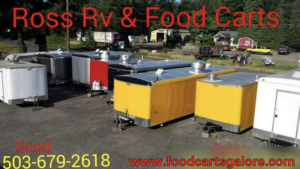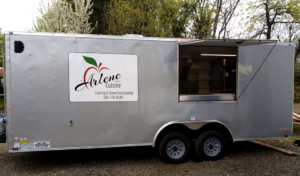Pergi ke luar talian dengan aplikasi Player FM !
Food Trucks vs Food Carts: Which One Is Better for You?
Manage episode 439794582 series 1539985
When it comes to mobile food businesses, Scott Ross has seen it all. As the owner of Ross RV’s and Food Carts, he’s spent years building both food trucks and food carts, giving him a unique perspective on the pros and cons of each. “It’s not a one-size-fits-all decision,” Ross says, “What’s right for one operator might be a nightmare for another.”
The Case for Food Trucks
If you’re looking for mobility and versatility, food trucks might be the way to go. “The biggest advantage with a food truck is that it’s self-contained,” Ross explains. “You’ve got everything in one unit—kitchen, storage, prep space, and the ability to drive to any location at a moment’s notice.” Food trucks are often ideal for operators who want to participate in various events or festivals, where mobility is key. You simply drive to the spot, set up, and start serving.

Our guest Scott Ross (right) with his son.
A truck also tends to offer more protection against the elements, which Ross says is crucial if you plan to work year-round. “When you’re inside a truck, you’ve got shelter from the weather, better temperature control, and overall a more comfortable working environment.”
However, food trucks can be costly. “You’re looking at a much higher upfront investment,” Ross notes. The build-out of a truck can run anywhere from $50,000 to $150,000, depending on the size and equipment you want installed. And then there’s the maintenance. “Trucks have engines, and that means more things that can break down,” he adds. If the truck’s engine needs repair, the whole business grinds to a halt until it’s fixed.
Here are the key takeaways from the section on food trucks:
- Mobility: Food trucks have the advantage of being fully mobile due to their engine, making it easier to relocate to better spots when needed or follow a regular route.
- Mechanical Risks: While food trucks offer flexibility, they are also prone to breakdowns. With engines, brakes, and tires to worry about, they have more potential mechanical failures than food carts.
- Used Truck Caution: When buying a used food truck, it’s essential to carefully inspect the engine, brakes, and tires. Overlooking these can lead to expensive repairs soon after the purchase, adding stress to a new business.
- Urban Advantage: Food trucks are easier to maneuver in tight downtown spaces, making them ideal for operators in urban environments.
- Cost: A no-frills food truck can be found for $40,000 to $50,000, but potential maintenance costs should be considered before purchase.
The Case for Food Carts
On the other hand, food carts offer a different set of benefits, especially when it comes to cost and simplicity. “Carts are much more affordable,” says Ross. “You can get a really good food cart built for between $30,000 and $45,000.” For entrepreneurs with smaller budgets or those just starting out, a food cart can be a more accessible entry point into the food business.
Another advantage of food carts is the ease of operation. “You’re not dealing with an engine or transmission,” Ross explains. “If something breaks on a cart, it’s usually something simple like a wheel or burner. You can fix it yourself for a lot less money and hassle.” This lower complexity can also mean fewer regulatory hurdles—depending on where you operate, food carts often face fewer permitting requirements than trucks.

Ross RV and Food Carts location.
However, the downside of a food cart is its reliance on external factors. “With a cart, you’re dependent on the elements,” Ross warns. “If it’s cold, hot, or raining, you’re stuck outside.” Additionally, carts are usually smaller, offering less space for food prep and storage, which can limit the menu options.
Here are the unique advantages of running a food cart:
- Lower Cost: Food carts are generally more affordable than food trucks, making them a lower-barrier option for entrepreneurs just starting out.
- Flexibility in Equipment: It’s easier to add equipment to a food cart or trailer due to the extra space. This allows for more cooking equipment and customization options.
- Stationary Use: Food carts are better suited for longer-term, stationary setups, like the popular food pods in Portland. They’re not ideal for quick stops or constant relocation, but they work well for catering and fairs.
- Space Requirements: While food carts take up more space than a truck, they are often a good fit for locations where space isn’t as limited.
- Towing: A reliable vehicle with sufficient horsepower is necessary to tow a food cart, adding to logistical considerations.
- Lower Taxes: Food carts may have lower taxes than food trucks because they aren’t self-propelled vehicles. However, it’s important to check local tax codes to confirm this advantage in your area.
In summary, food carts offer a more cost-effective, stationary-friendly option with flexibility in equipment but require a reliable towing vehicle and potentially take up more space than food trucks.
Which One Is Right for You?
The decision between a food truck and a food cart ultimately comes down to your business model, budget, and goals. “If you’re planning to do high-volume, big events, or need to move around a lot, a food truck is probably the better choice,” says Ross. On the flip side, “if you’re looking to start small, save money, or operate in a more confined space, like a farmer’s market or a downtown sidewalk, a food cart can be perfect.”

A food trailer build by Scott Ross.
Ross emphasizes that neither option is inherently better than the other—it’s about finding the right fit for your business. “At the end of the day, both food trucks and carts can be successful. It’s all about how you run them.”
Whether you’re opting for the mobility of a truck or the simplicity of a cart, one thing is clear: both have their place in the booming world of mobile food.
In this podcast you’ll learn the answer to the most frequently asked question Ross gets about building custom food carts. He also shares a list of items you should be thinking about before approaching a manufacturer to build your vehicle, including type of kitchen you want, the pots, pans, shelving that you want on the truck, local health codes, and of course their budget. After all of this information is compiled a floor plan is finalized so that it can be submitted to the local health department. Going through this process helps ensure the inspection process goes fast so that the owner can get up and running as fast as possible.
Ross has helped launch a variety of mobile food businesses and provides some really helpful advice on the importance of location and having a unique food concept that helps draw customers to you. If you want a different perspective on this subject, our previous guest Laney Strange selected a trailer for her smoothie business. Learn why she decided to get a food trailer listening to this episode.
The post Food Trucks vs Food Carts: Which One Is Better for You? appeared first on Food Truck Empire.
12 episod
Manage episode 439794582 series 1539985
When it comes to mobile food businesses, Scott Ross has seen it all. As the owner of Ross RV’s and Food Carts, he’s spent years building both food trucks and food carts, giving him a unique perspective on the pros and cons of each. “It’s not a one-size-fits-all decision,” Ross says, “What’s right for one operator might be a nightmare for another.”
The Case for Food Trucks
If you’re looking for mobility and versatility, food trucks might be the way to go. “The biggest advantage with a food truck is that it’s self-contained,” Ross explains. “You’ve got everything in one unit—kitchen, storage, prep space, and the ability to drive to any location at a moment’s notice.” Food trucks are often ideal for operators who want to participate in various events or festivals, where mobility is key. You simply drive to the spot, set up, and start serving.

Our guest Scott Ross (right) with his son.
A truck also tends to offer more protection against the elements, which Ross says is crucial if you plan to work year-round. “When you’re inside a truck, you’ve got shelter from the weather, better temperature control, and overall a more comfortable working environment.”
However, food trucks can be costly. “You’re looking at a much higher upfront investment,” Ross notes. The build-out of a truck can run anywhere from $50,000 to $150,000, depending on the size and equipment you want installed. And then there’s the maintenance. “Trucks have engines, and that means more things that can break down,” he adds. If the truck’s engine needs repair, the whole business grinds to a halt until it’s fixed.
Here are the key takeaways from the section on food trucks:
- Mobility: Food trucks have the advantage of being fully mobile due to their engine, making it easier to relocate to better spots when needed or follow a regular route.
- Mechanical Risks: While food trucks offer flexibility, they are also prone to breakdowns. With engines, brakes, and tires to worry about, they have more potential mechanical failures than food carts.
- Used Truck Caution: When buying a used food truck, it’s essential to carefully inspect the engine, brakes, and tires. Overlooking these can lead to expensive repairs soon after the purchase, adding stress to a new business.
- Urban Advantage: Food trucks are easier to maneuver in tight downtown spaces, making them ideal for operators in urban environments.
- Cost: A no-frills food truck can be found for $40,000 to $50,000, but potential maintenance costs should be considered before purchase.
The Case for Food Carts
On the other hand, food carts offer a different set of benefits, especially when it comes to cost and simplicity. “Carts are much more affordable,” says Ross. “You can get a really good food cart built for between $30,000 and $45,000.” For entrepreneurs with smaller budgets or those just starting out, a food cart can be a more accessible entry point into the food business.
Another advantage of food carts is the ease of operation. “You’re not dealing with an engine or transmission,” Ross explains. “If something breaks on a cart, it’s usually something simple like a wheel or burner. You can fix it yourself for a lot less money and hassle.” This lower complexity can also mean fewer regulatory hurdles—depending on where you operate, food carts often face fewer permitting requirements than trucks.

Ross RV and Food Carts location.
However, the downside of a food cart is its reliance on external factors. “With a cart, you’re dependent on the elements,” Ross warns. “If it’s cold, hot, or raining, you’re stuck outside.” Additionally, carts are usually smaller, offering less space for food prep and storage, which can limit the menu options.
Here are the unique advantages of running a food cart:
- Lower Cost: Food carts are generally more affordable than food trucks, making them a lower-barrier option for entrepreneurs just starting out.
- Flexibility in Equipment: It’s easier to add equipment to a food cart or trailer due to the extra space. This allows for more cooking equipment and customization options.
- Stationary Use: Food carts are better suited for longer-term, stationary setups, like the popular food pods in Portland. They’re not ideal for quick stops or constant relocation, but they work well for catering and fairs.
- Space Requirements: While food carts take up more space than a truck, they are often a good fit for locations where space isn’t as limited.
- Towing: A reliable vehicle with sufficient horsepower is necessary to tow a food cart, adding to logistical considerations.
- Lower Taxes: Food carts may have lower taxes than food trucks because they aren’t self-propelled vehicles. However, it’s important to check local tax codes to confirm this advantage in your area.
In summary, food carts offer a more cost-effective, stationary-friendly option with flexibility in equipment but require a reliable towing vehicle and potentially take up more space than food trucks.
Which One Is Right for You?
The decision between a food truck and a food cart ultimately comes down to your business model, budget, and goals. “If you’re planning to do high-volume, big events, or need to move around a lot, a food truck is probably the better choice,” says Ross. On the flip side, “if you’re looking to start small, save money, or operate in a more confined space, like a farmer’s market or a downtown sidewalk, a food cart can be perfect.”

A food trailer build by Scott Ross.
Ross emphasizes that neither option is inherently better than the other—it’s about finding the right fit for your business. “At the end of the day, both food trucks and carts can be successful. It’s all about how you run them.”
Whether you’re opting for the mobility of a truck or the simplicity of a cart, one thing is clear: both have their place in the booming world of mobile food.
In this podcast you’ll learn the answer to the most frequently asked question Ross gets about building custom food carts. He also shares a list of items you should be thinking about before approaching a manufacturer to build your vehicle, including type of kitchen you want, the pots, pans, shelving that you want on the truck, local health codes, and of course their budget. After all of this information is compiled a floor plan is finalized so that it can be submitted to the local health department. Going through this process helps ensure the inspection process goes fast so that the owner can get up and running as fast as possible.
Ross has helped launch a variety of mobile food businesses and provides some really helpful advice on the importance of location and having a unique food concept that helps draw customers to you. If you want a different perspective on this subject, our previous guest Laney Strange selected a trailer for her smoothie business. Learn why she decided to get a food trailer listening to this episode.
The post Food Trucks vs Food Carts: Which One Is Better for You? appeared first on Food Truck Empire.
12 episod
Semua episod
×Selamat datang ke Player FM
Player FM mengimbas laman-laman web bagi podcast berkualiti tinggi untuk anda nikmati sekarang. Ia merupakan aplikasi podcast terbaik dan berfungsi untuk Android, iPhone, dan web. Daftar untuk melaraskan langganan merentasi peranti.




